Research Methodology for Studying Leisure Activities and Behaviors of UCLan Students
VerifiedAdded on 2023/01/19
|13
|2930
|33
AI Summary
This document discusses the research methodology used to study the leisure activities and behaviors of students at UCLan. It explores the qualitative approach chosen and the ethical considerations involved. The document also provides an overview of the primary data collection instruments used, including observation, questionnaires, and interviews. It presents the initial findings of the study and reviews the pilot study.
Contribute Materials
Your contribution can guide someone’s learning journey. Share your
documents today.
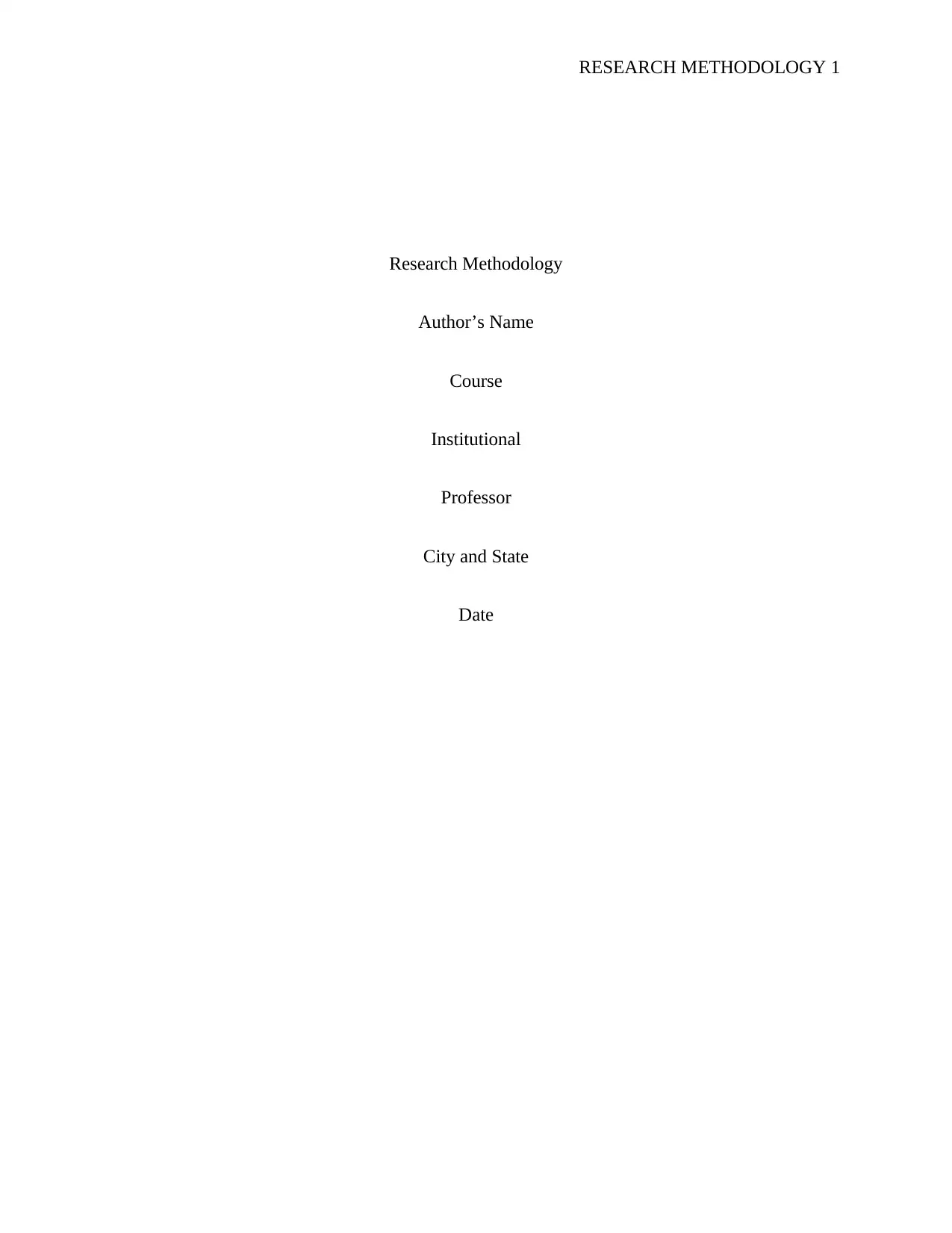
RESEARCH METHODOLOGY 1
Research Methodology
Author’s Name
Course
Institutional
Professor
City and State
Date
Research Methodology
Author’s Name
Course
Institutional
Professor
City and State
Date
Secure Best Marks with AI Grader
Need help grading? Try our AI Grader for instant feedback on your assignments.
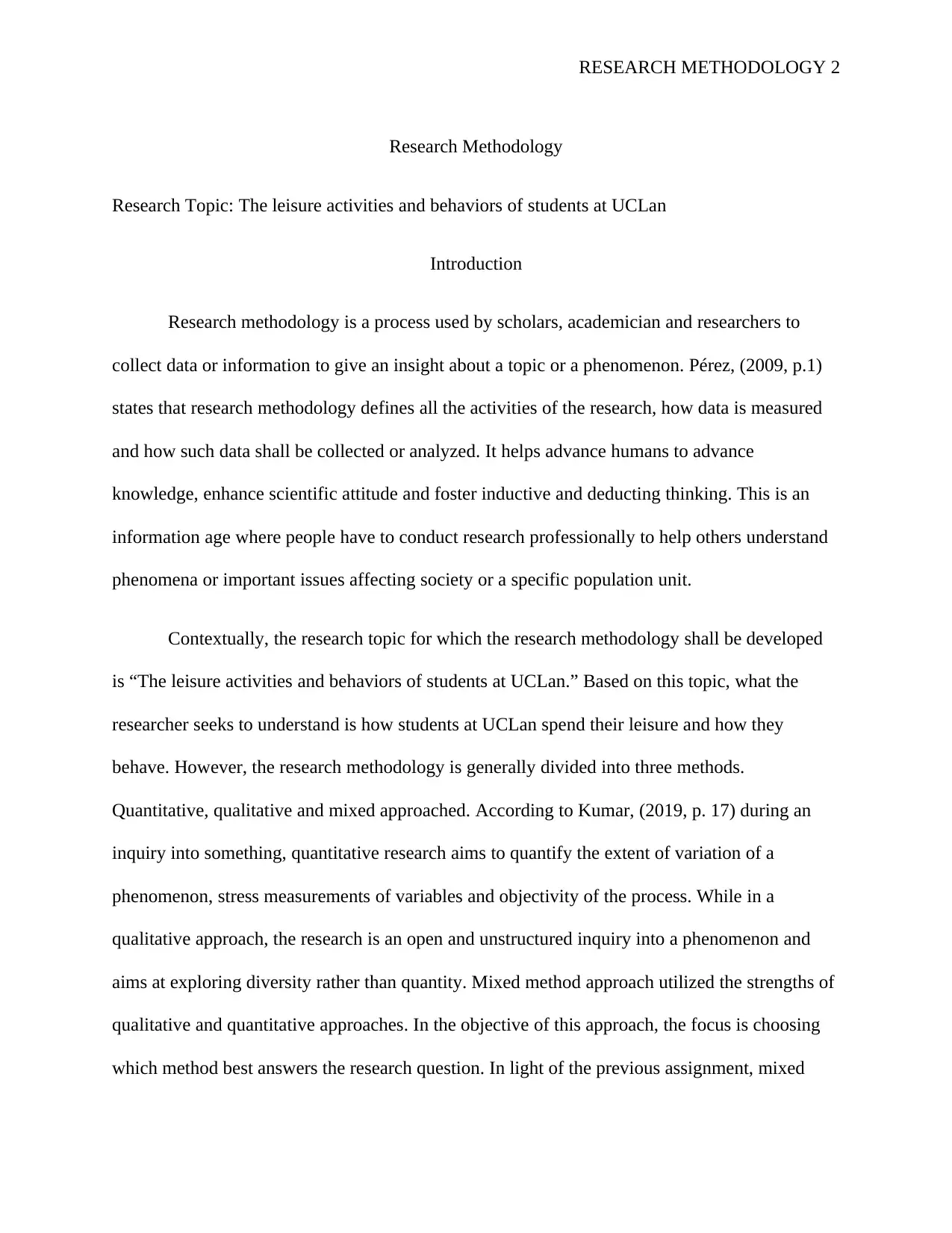
RESEARCH METHODOLOGY 2
Research Methodology
Research Topic: The leisure activities and behaviors of students at UCLan
Introduction
Research methodology is a process used by scholars, academician and researchers to
collect data or information to give an insight about a topic or a phenomenon. Pérez, (2009, p.1)
states that research methodology defines all the activities of the research, how data is measured
and how such data shall be collected or analyzed. It helps advance humans to advance
knowledge, enhance scientific attitude and foster inductive and deducting thinking. This is an
information age where people have to conduct research professionally to help others understand
phenomena or important issues affecting society or a specific population unit.
Contextually, the research topic for which the research methodology shall be developed
is “The leisure activities and behaviors of students at UCLan.” Based on this topic, what the
researcher seeks to understand is how students at UCLan spend their leisure and how they
behave. However, the research methodology is generally divided into three methods.
Quantitative, qualitative and mixed approached. According to Kumar, (2019, p. 17) during an
inquiry into something, quantitative research aims to quantify the extent of variation of a
phenomenon, stress measurements of variables and objectivity of the process. While in a
qualitative approach, the research is an open and unstructured inquiry into a phenomenon and
aims at exploring diversity rather than quantity. Mixed method approach utilized the strengths of
qualitative and quantitative approaches. In the objective of this approach, the focus is choosing
which method best answers the research question. In light of the previous assignment, mixed
Research Methodology
Research Topic: The leisure activities and behaviors of students at UCLan
Introduction
Research methodology is a process used by scholars, academician and researchers to
collect data or information to give an insight about a topic or a phenomenon. Pérez, (2009, p.1)
states that research methodology defines all the activities of the research, how data is measured
and how such data shall be collected or analyzed. It helps advance humans to advance
knowledge, enhance scientific attitude and foster inductive and deducting thinking. This is an
information age where people have to conduct research professionally to help others understand
phenomena or important issues affecting society or a specific population unit.
Contextually, the research topic for which the research methodology shall be developed
is “The leisure activities and behaviors of students at UCLan.” Based on this topic, what the
researcher seeks to understand is how students at UCLan spend their leisure and how they
behave. However, the research methodology is generally divided into three methods.
Quantitative, qualitative and mixed approached. According to Kumar, (2019, p. 17) during an
inquiry into something, quantitative research aims to quantify the extent of variation of a
phenomenon, stress measurements of variables and objectivity of the process. While in a
qualitative approach, the research is an open and unstructured inquiry into a phenomenon and
aims at exploring diversity rather than quantity. Mixed method approach utilized the strengths of
qualitative and quantitative approaches. In the objective of this approach, the focus is choosing
which method best answers the research question. In light of the previous assignment, mixed
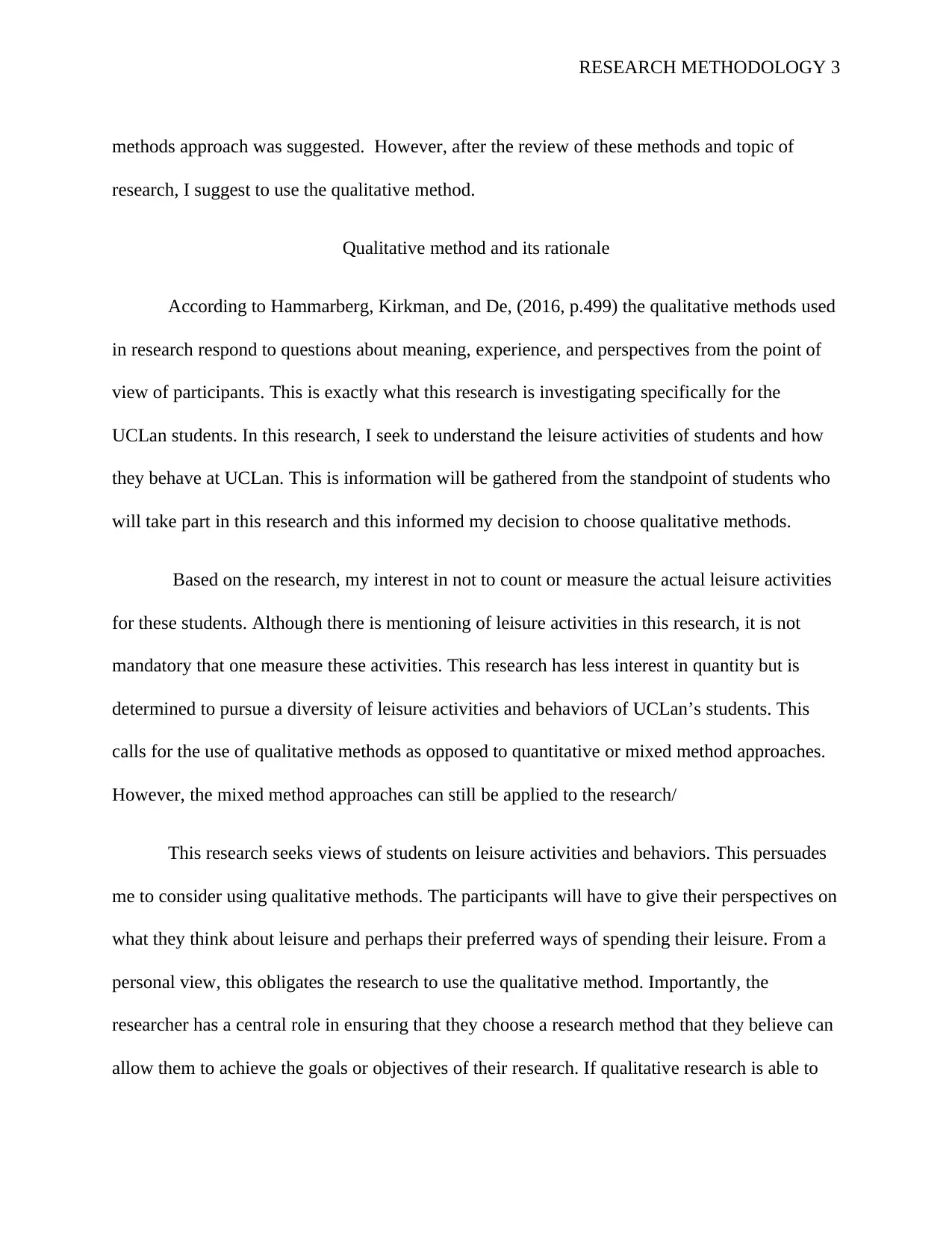
RESEARCH METHODOLOGY 3
methods approach was suggested. However, after the review of these methods and topic of
research, I suggest to use the qualitative method.
Qualitative method and its rationale
According to Hammarberg, Kirkman, and De, (2016, p.499) the qualitative methods used
in research respond to questions about meaning, experience, and perspectives from the point of
view of participants. This is exactly what this research is investigating specifically for the
UCLan students. In this research, I seek to understand the leisure activities of students and how
they behave at UCLan. This is information will be gathered from the standpoint of students who
will take part in this research and this informed my decision to choose qualitative methods.
Based on the research, my interest in not to count or measure the actual leisure activities
for these students. Although there is mentioning of leisure activities in this research, it is not
mandatory that one measure these activities. This research has less interest in quantity but is
determined to pursue a diversity of leisure activities and behaviors of UCLan’s students. This
calls for the use of qualitative methods as opposed to quantitative or mixed method approaches.
However, the mixed method approaches can still be applied to the research/
This research seeks views of students on leisure activities and behaviors. This persuades
me to consider using qualitative methods. The participants will have to give their perspectives on
what they think about leisure and perhaps their preferred ways of spending their leisure. From a
personal view, this obligates the research to use the qualitative method. Importantly, the
researcher has a central role in ensuring that they choose a research method that they believe can
allow them to achieve the goals or objectives of their research. If qualitative research is able to
methods approach was suggested. However, after the review of these methods and topic of
research, I suggest to use the qualitative method.
Qualitative method and its rationale
According to Hammarberg, Kirkman, and De, (2016, p.499) the qualitative methods used
in research respond to questions about meaning, experience, and perspectives from the point of
view of participants. This is exactly what this research is investigating specifically for the
UCLan students. In this research, I seek to understand the leisure activities of students and how
they behave at UCLan. This is information will be gathered from the standpoint of students who
will take part in this research and this informed my decision to choose qualitative methods.
Based on the research, my interest in not to count or measure the actual leisure activities
for these students. Although there is mentioning of leisure activities in this research, it is not
mandatory that one measure these activities. This research has less interest in quantity but is
determined to pursue a diversity of leisure activities and behaviors of UCLan’s students. This
calls for the use of qualitative methods as opposed to quantitative or mixed method approaches.
However, the mixed method approaches can still be applied to the research/
This research seeks views of students on leisure activities and behaviors. This persuades
me to consider using qualitative methods. The participants will have to give their perspectives on
what they think about leisure and perhaps their preferred ways of spending their leisure. From a
personal view, this obligates the research to use the qualitative method. Importantly, the
researcher has a central role in ensuring that they choose a research method that they believe can
allow them to achieve the goals or objectives of their research. If qualitative research is able to
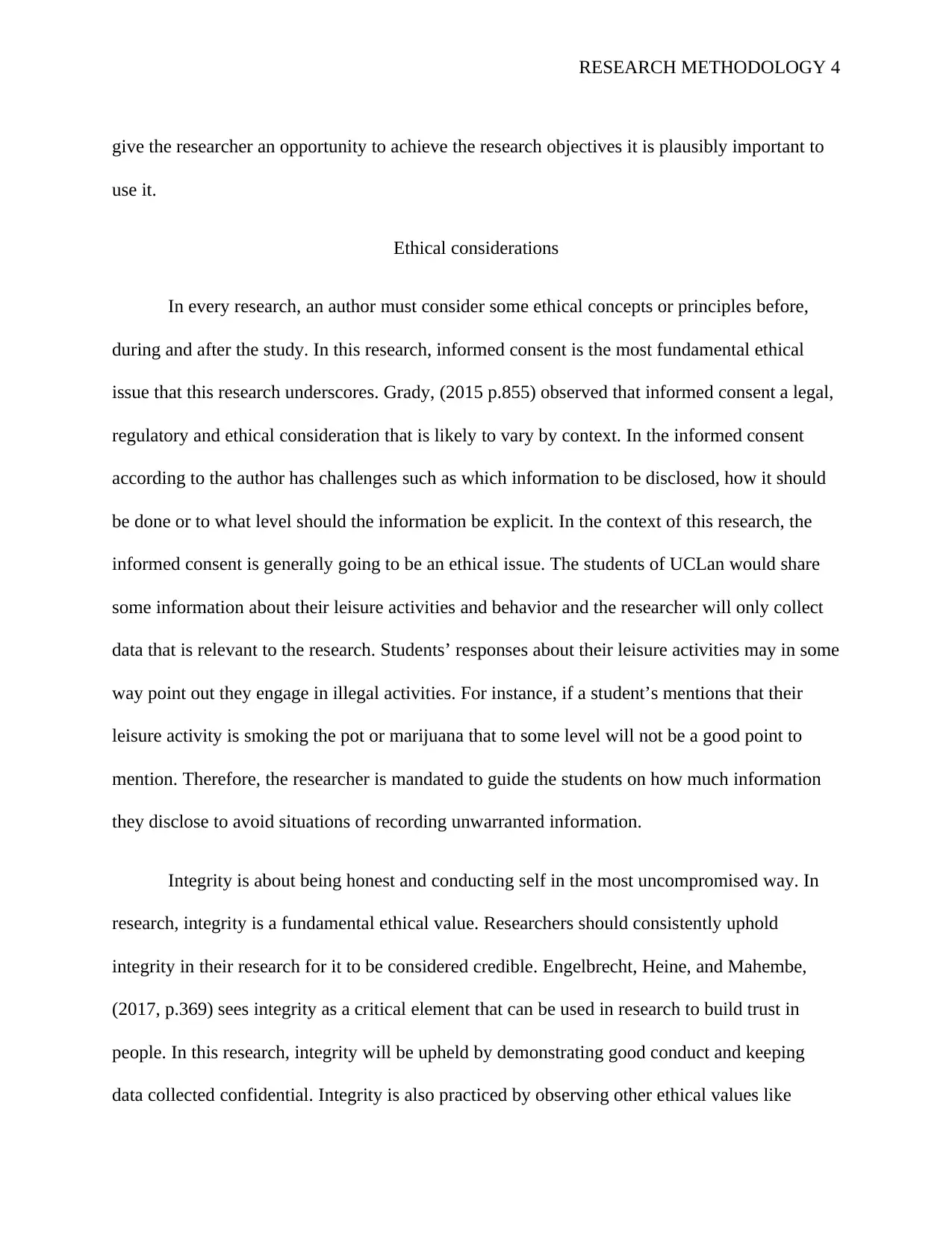
RESEARCH METHODOLOGY 4
give the researcher an opportunity to achieve the research objectives it is plausibly important to
use it.
Ethical considerations
In every research, an author must consider some ethical concepts or principles before,
during and after the study. In this research, informed consent is the most fundamental ethical
issue that this research underscores. Grady, (2015 p.855) observed that informed consent a legal,
regulatory and ethical consideration that is likely to vary by context. In the informed consent
according to the author has challenges such as which information to be disclosed, how it should
be done or to what level should the information be explicit. In the context of this research, the
informed consent is generally going to be an ethical issue. The students of UCLan would share
some information about their leisure activities and behavior and the researcher will only collect
data that is relevant to the research. Students’ responses about their leisure activities may in some
way point out they engage in illegal activities. For instance, if a student’s mentions that their
leisure activity is smoking the pot or marijuana that to some level will not be a good point to
mention. Therefore, the researcher is mandated to guide the students on how much information
they disclose to avoid situations of recording unwarranted information.
Integrity is about being honest and conducting self in the most uncompromised way. In
research, integrity is a fundamental ethical value. Researchers should consistently uphold
integrity in their research for it to be considered credible. Engelbrecht, Heine, and Mahembe,
(2017, p.369) sees integrity as a critical element that can be used in research to build trust in
people. In this research, integrity will be upheld by demonstrating good conduct and keeping
data collected confidential. Integrity is also practiced by observing other ethical values like
give the researcher an opportunity to achieve the research objectives it is plausibly important to
use it.
Ethical considerations
In every research, an author must consider some ethical concepts or principles before,
during and after the study. In this research, informed consent is the most fundamental ethical
issue that this research underscores. Grady, (2015 p.855) observed that informed consent a legal,
regulatory and ethical consideration that is likely to vary by context. In the informed consent
according to the author has challenges such as which information to be disclosed, how it should
be done or to what level should the information be explicit. In the context of this research, the
informed consent is generally going to be an ethical issue. The students of UCLan would share
some information about their leisure activities and behavior and the researcher will only collect
data that is relevant to the research. Students’ responses about their leisure activities may in some
way point out they engage in illegal activities. For instance, if a student’s mentions that their
leisure activity is smoking the pot or marijuana that to some level will not be a good point to
mention. Therefore, the researcher is mandated to guide the students on how much information
they disclose to avoid situations of recording unwarranted information.
Integrity is about being honest and conducting self in the most uncompromised way. In
research, integrity is a fundamental ethical value. Researchers should consistently uphold
integrity in their research for it to be considered credible. Engelbrecht, Heine, and Mahembe,
(2017, p.369) sees integrity as a critical element that can be used in research to build trust in
people. In this research, integrity will be upheld by demonstrating good conduct and keeping
data collected confidential. Integrity is also practiced by observing other ethical values like
Secure Best Marks with AI Grader
Need help grading? Try our AI Grader for instant feedback on your assignments.
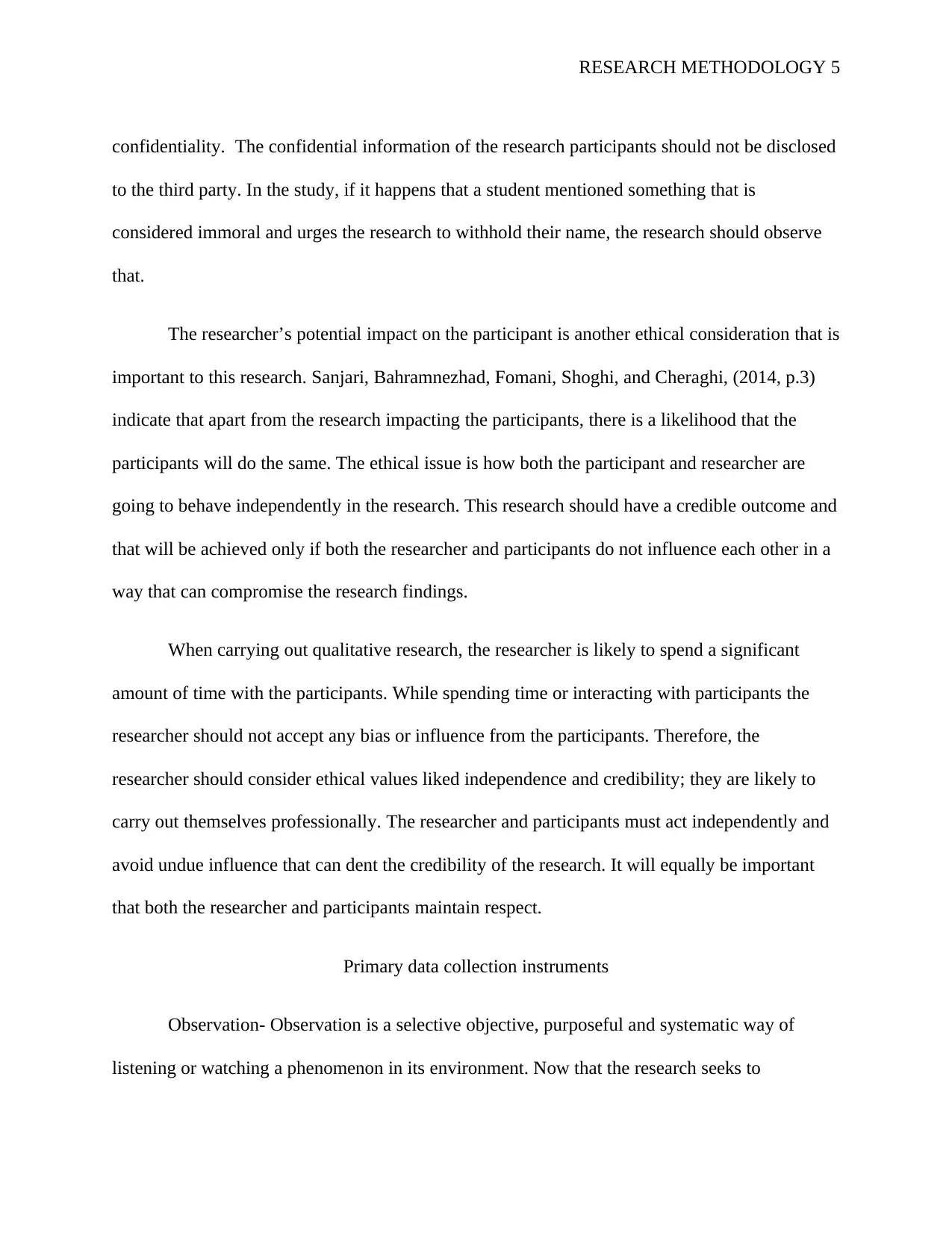
RESEARCH METHODOLOGY 5
confidentiality. The confidential information of the research participants should not be disclosed
to the third party. In the study, if it happens that a student mentioned something that is
considered immoral and urges the research to withhold their name, the research should observe
that.
The researcher’s potential impact on the participant is another ethical consideration that is
important to this research. Sanjari, Bahramnezhad, Fomani, Shoghi, and Cheraghi, (2014, p.3)
indicate that apart from the research impacting the participants, there is a likelihood that the
participants will do the same. The ethical issue is how both the participant and researcher are
going to behave independently in the research. This research should have a credible outcome and
that will be achieved only if both the researcher and participants do not influence each other in a
way that can compromise the research findings.
When carrying out qualitative research, the researcher is likely to spend a significant
amount of time with the participants. While spending time or interacting with participants the
researcher should not accept any bias or influence from the participants. Therefore, the
researcher should consider ethical values liked independence and credibility; they are likely to
carry out themselves professionally. The researcher and participants must act independently and
avoid undue influence that can dent the credibility of the research. It will equally be important
that both the researcher and participants maintain respect.
Primary data collection instruments
Observation- Observation is a selective objective, purposeful and systematic way of
listening or watching a phenomenon in its environment. Now that the research seeks to
confidentiality. The confidential information of the research participants should not be disclosed
to the third party. In the study, if it happens that a student mentioned something that is
considered immoral and urges the research to withhold their name, the research should observe
that.
The researcher’s potential impact on the participant is another ethical consideration that is
important to this research. Sanjari, Bahramnezhad, Fomani, Shoghi, and Cheraghi, (2014, p.3)
indicate that apart from the research impacting the participants, there is a likelihood that the
participants will do the same. The ethical issue is how both the participant and researcher are
going to behave independently in the research. This research should have a credible outcome and
that will be achieved only if both the researcher and participants do not influence each other in a
way that can compromise the research findings.
When carrying out qualitative research, the researcher is likely to spend a significant
amount of time with the participants. While spending time or interacting with participants the
researcher should not accept any bias or influence from the participants. Therefore, the
researcher should consider ethical values liked independence and credibility; they are likely to
carry out themselves professionally. The researcher and participants must act independently and
avoid undue influence that can dent the credibility of the research. It will equally be important
that both the researcher and participants maintain respect.
Primary data collection instruments
Observation- Observation is a selective objective, purposeful and systematic way of
listening or watching a phenomenon in its environment. Now that the research seeks to
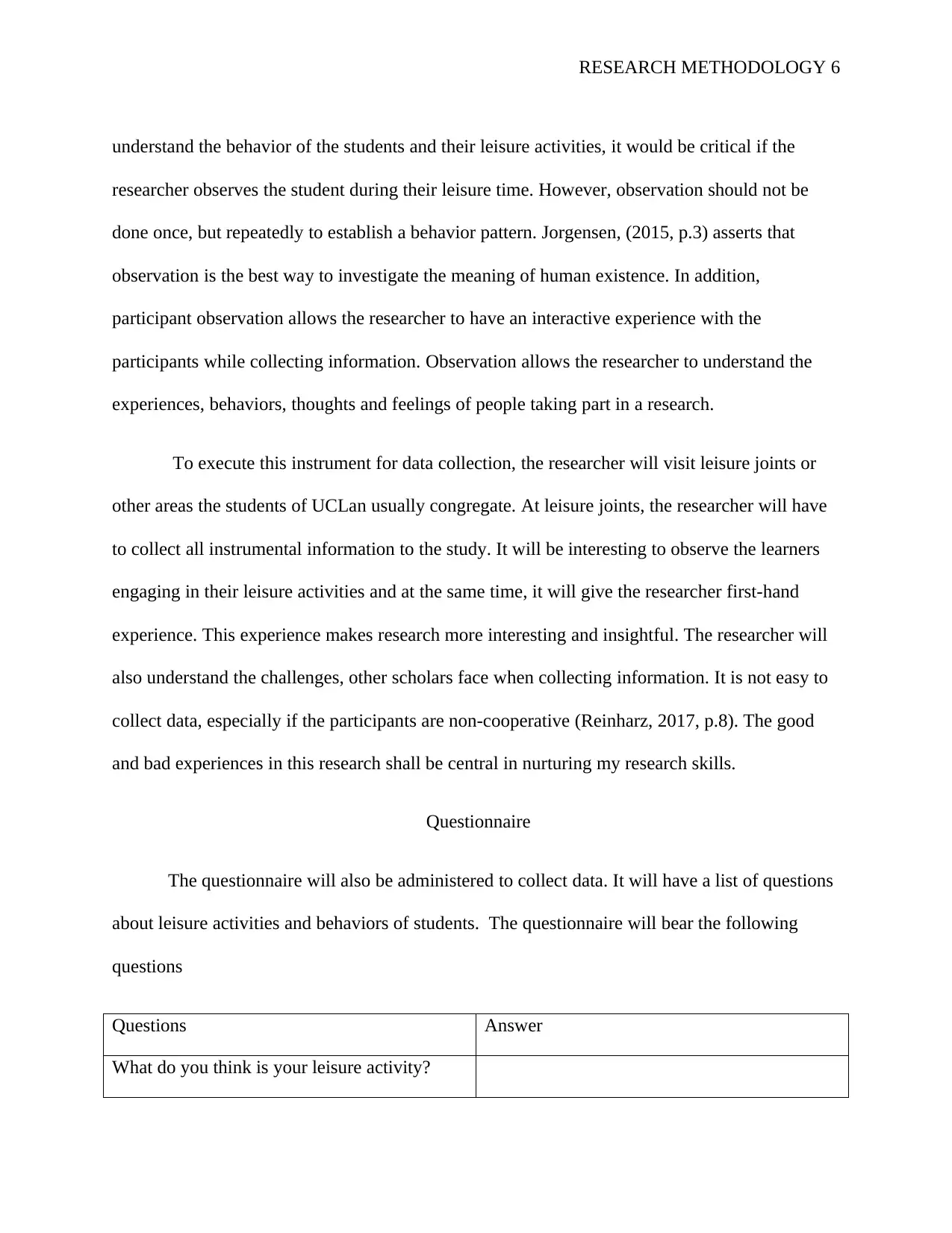
RESEARCH METHODOLOGY 6
understand the behavior of the students and their leisure activities, it would be critical if the
researcher observes the student during their leisure time. However, observation should not be
done once, but repeatedly to establish a behavior pattern. Jorgensen, (2015, p.3) asserts that
observation is the best way to investigate the meaning of human existence. In addition,
participant observation allows the researcher to have an interactive experience with the
participants while collecting information. Observation allows the researcher to understand the
experiences, behaviors, thoughts and feelings of people taking part in a research.
To execute this instrument for data collection, the researcher will visit leisure joints or
other areas the students of UCLan usually congregate. At leisure joints, the researcher will have
to collect all instrumental information to the study. It will be interesting to observe the learners
engaging in their leisure activities and at the same time, it will give the researcher first-hand
experience. This experience makes research more interesting and insightful. The researcher will
also understand the challenges, other scholars face when collecting information. It is not easy to
collect data, especially if the participants are non-cooperative (Reinharz, 2017, p.8). The good
and bad experiences in this research shall be central in nurturing my research skills.
Questionnaire
The questionnaire will also be administered to collect data. It will have a list of questions
about leisure activities and behaviors of students. The questionnaire will bear the following
questions
Questions Answer
What do you think is your leisure activity?
understand the behavior of the students and their leisure activities, it would be critical if the
researcher observes the student during their leisure time. However, observation should not be
done once, but repeatedly to establish a behavior pattern. Jorgensen, (2015, p.3) asserts that
observation is the best way to investigate the meaning of human existence. In addition,
participant observation allows the researcher to have an interactive experience with the
participants while collecting information. Observation allows the researcher to understand the
experiences, behaviors, thoughts and feelings of people taking part in a research.
To execute this instrument for data collection, the researcher will visit leisure joints or
other areas the students of UCLan usually congregate. At leisure joints, the researcher will have
to collect all instrumental information to the study. It will be interesting to observe the learners
engaging in their leisure activities and at the same time, it will give the researcher first-hand
experience. This experience makes research more interesting and insightful. The researcher will
also understand the challenges, other scholars face when collecting information. It is not easy to
collect data, especially if the participants are non-cooperative (Reinharz, 2017, p.8). The good
and bad experiences in this research shall be central in nurturing my research skills.
Questionnaire
The questionnaire will also be administered to collect data. It will have a list of questions
about leisure activities and behaviors of students. The questionnaire will bear the following
questions
Questions Answer
What do you think is your leisure activity?
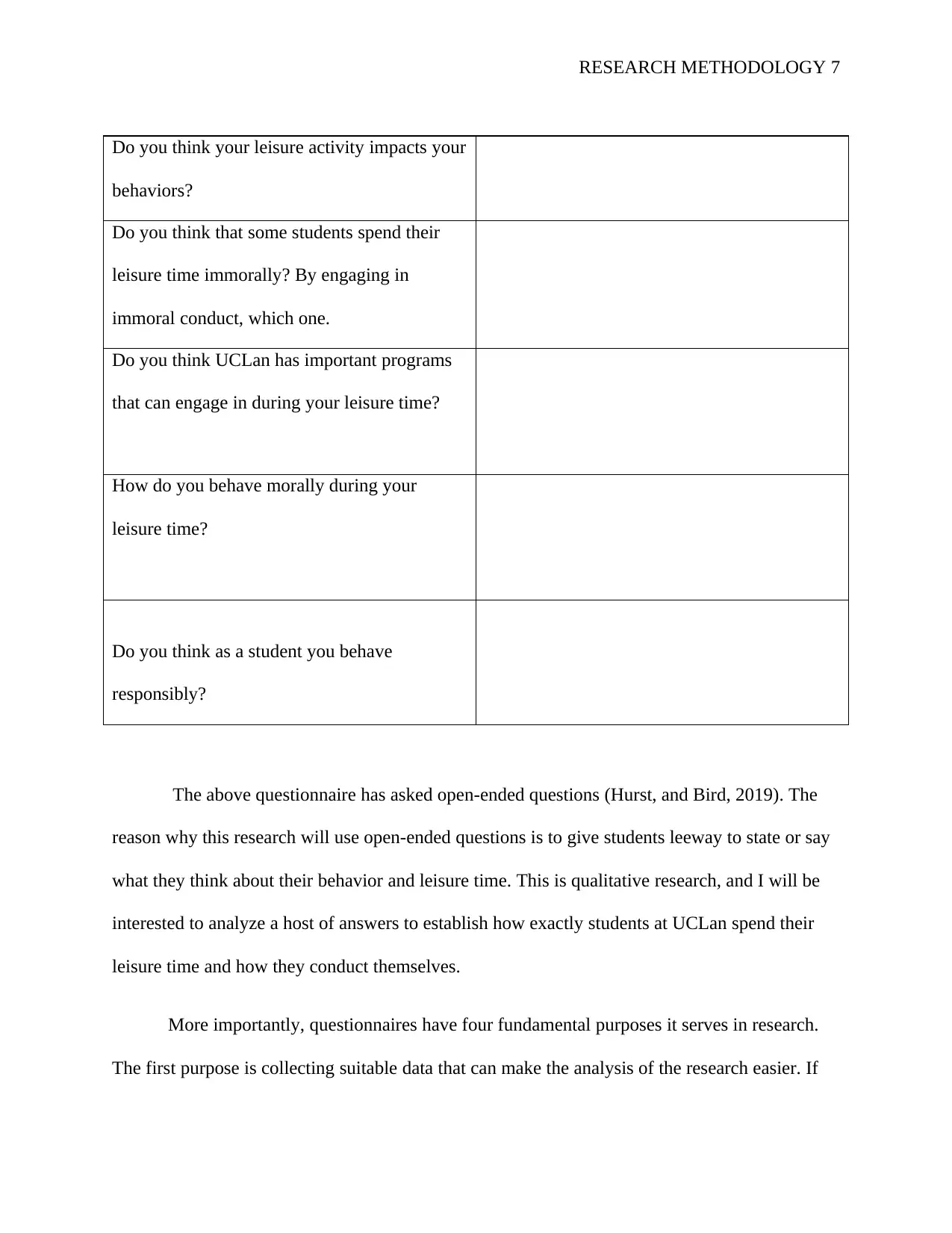
RESEARCH METHODOLOGY 7
Do you think your leisure activity impacts your
behaviors?
Do you think that some students spend their
leisure time immorally? By engaging in
immoral conduct, which one.
Do you think UCLan has important programs
that can engage in during your leisure time?
How do you behave morally during your
leisure time?
Do you think as a student you behave
responsibly?
The above questionnaire has asked open-ended questions (Hurst, and Bird, 2019). The
reason why this research will use open-ended questions is to give students leeway to state or say
what they think about their behavior and leisure time. This is qualitative research, and I will be
interested to analyze a host of answers to establish how exactly students at UCLan spend their
leisure time and how they conduct themselves.
More importantly, questionnaires have four fundamental purposes it serves in research.
The first purpose is collecting suitable data that can make the analysis of the research easier. If
Do you think your leisure activity impacts your
behaviors?
Do you think that some students spend their
leisure time immorally? By engaging in
immoral conduct, which one.
Do you think UCLan has important programs
that can engage in during your leisure time?
How do you behave morally during your
leisure time?
Do you think as a student you behave
responsibly?
The above questionnaire has asked open-ended questions (Hurst, and Bird, 2019). The
reason why this research will use open-ended questions is to give students leeway to state or say
what they think about their behavior and leisure time. This is qualitative research, and I will be
interested to analyze a host of answers to establish how exactly students at UCLan spend their
leisure time and how they conduct themselves.
More importantly, questionnaires have four fundamental purposes it serves in research.
The first purpose is collecting suitable data that can make the analysis of the research easier. If
Paraphrase This Document
Need a fresh take? Get an instant paraphrase of this document with our AI Paraphraser
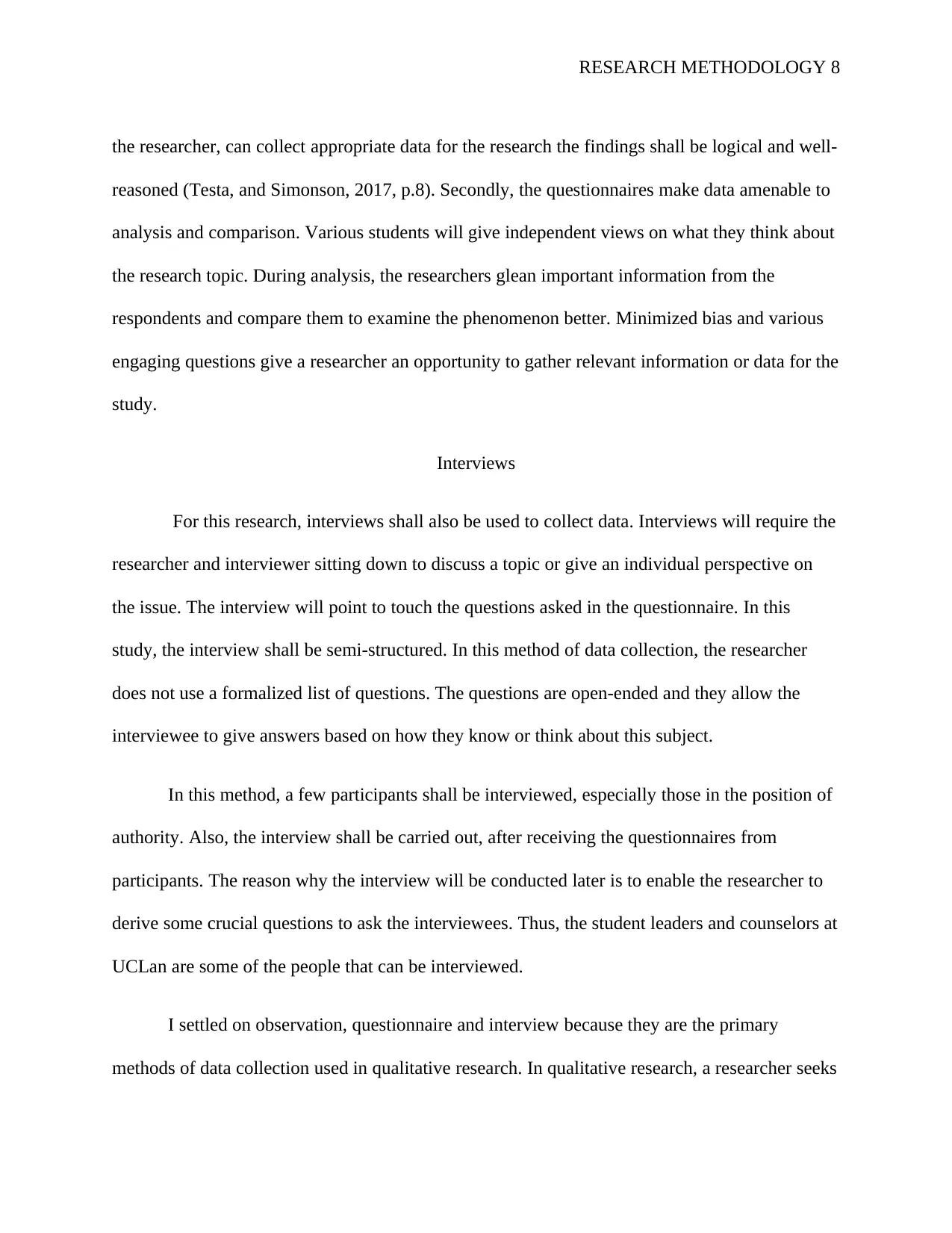
RESEARCH METHODOLOGY 8
the researcher, can collect appropriate data for the research the findings shall be logical and well-
reasoned (Testa, and Simonson, 2017, p.8). Secondly, the questionnaires make data amenable to
analysis and comparison. Various students will give independent views on what they think about
the research topic. During analysis, the researchers glean important information from the
respondents and compare them to examine the phenomenon better. Minimized bias and various
engaging questions give a researcher an opportunity to gather relevant information or data for the
study.
Interviews
For this research, interviews shall also be used to collect data. Interviews will require the
researcher and interviewer sitting down to discuss a topic or give an individual perspective on
the issue. The interview will point to touch the questions asked in the questionnaire. In this
study, the interview shall be semi-structured. In this method of data collection, the researcher
does not use a formalized list of questions. The questions are open-ended and they allow the
interviewee to give answers based on how they know or think about this subject.
In this method, a few participants shall be interviewed, especially those in the position of
authority. Also, the interview shall be carried out, after receiving the questionnaires from
participants. The reason why the interview will be conducted later is to enable the researcher to
derive some crucial questions to ask the interviewees. Thus, the student leaders and counselors at
UCLan are some of the people that can be interviewed.
I settled on observation, questionnaire and interview because they are the primary
methods of data collection used in qualitative research. In qualitative research, a researcher seeks
the researcher, can collect appropriate data for the research the findings shall be logical and well-
reasoned (Testa, and Simonson, 2017, p.8). Secondly, the questionnaires make data amenable to
analysis and comparison. Various students will give independent views on what they think about
the research topic. During analysis, the researchers glean important information from the
respondents and compare them to examine the phenomenon better. Minimized bias and various
engaging questions give a researcher an opportunity to gather relevant information or data for the
study.
Interviews
For this research, interviews shall also be used to collect data. Interviews will require the
researcher and interviewer sitting down to discuss a topic or give an individual perspective on
the issue. The interview will point to touch the questions asked in the questionnaire. In this
study, the interview shall be semi-structured. In this method of data collection, the researcher
does not use a formalized list of questions. The questions are open-ended and they allow the
interviewee to give answers based on how they know or think about this subject.
In this method, a few participants shall be interviewed, especially those in the position of
authority. Also, the interview shall be carried out, after receiving the questionnaires from
participants. The reason why the interview will be conducted later is to enable the researcher to
derive some crucial questions to ask the interviewees. Thus, the student leaders and counselors at
UCLan are some of the people that can be interviewed.
I settled on observation, questionnaire and interview because they are the primary
methods of data collection used in qualitative research. In qualitative research, a researcher seeks
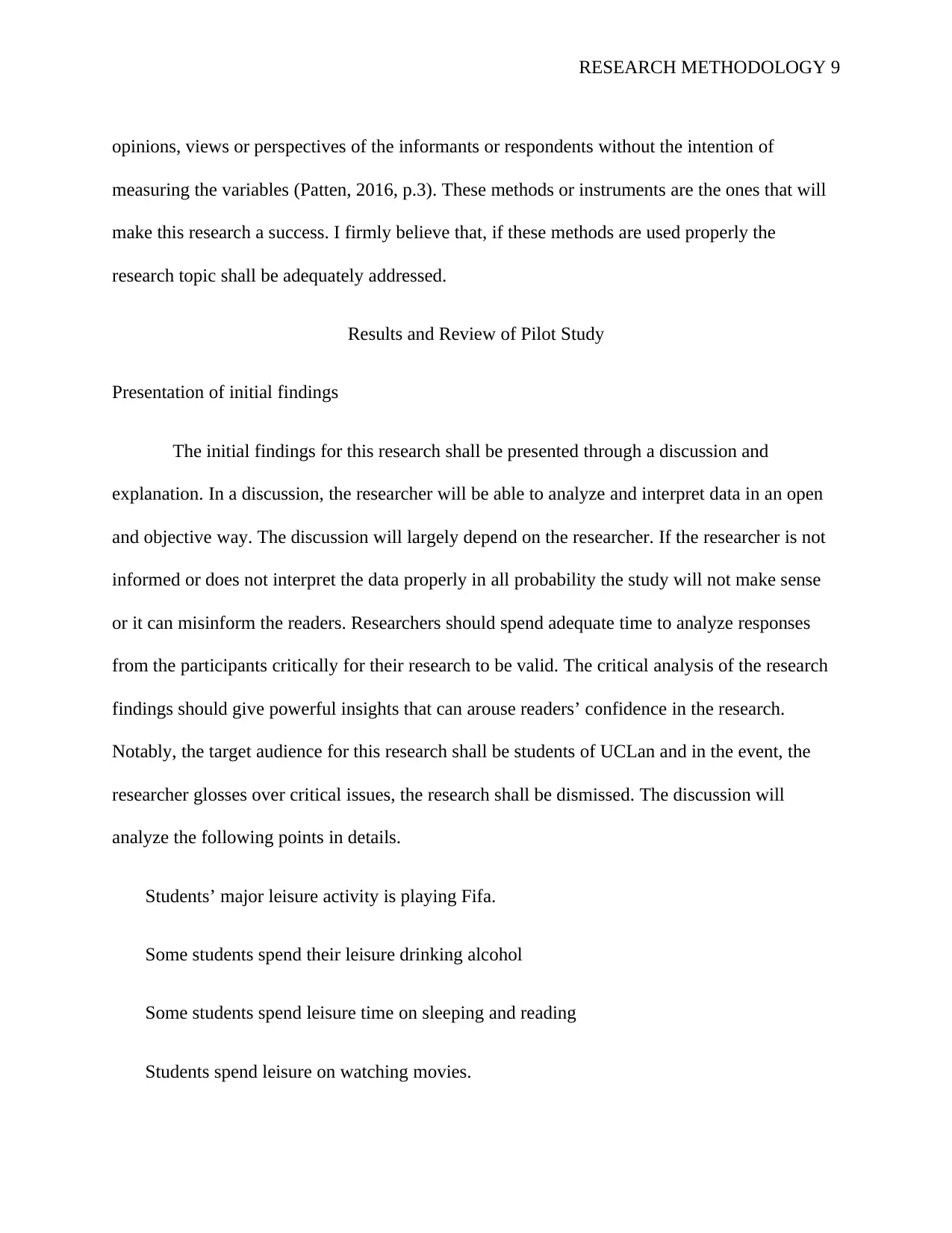
RESEARCH METHODOLOGY 9
opinions, views or perspectives of the informants or respondents without the intention of
measuring the variables (Patten, 2016, p.3). These methods or instruments are the ones that will
make this research a success. I firmly believe that, if these methods are used properly the
research topic shall be adequately addressed.
Results and Review of Pilot Study
Presentation of initial findings
The initial findings for this research shall be presented through a discussion and
explanation. In a discussion, the researcher will be able to analyze and interpret data in an open
and objective way. The discussion will largely depend on the researcher. If the researcher is not
informed or does not interpret the data properly in all probability the study will not make sense
or it can misinform the readers. Researchers should spend adequate time to analyze responses
from the participants critically for their research to be valid. The critical analysis of the research
findings should give powerful insights that can arouse readers’ confidence in the research.
Notably, the target audience for this research shall be students of UCLan and in the event, the
researcher glosses over critical issues, the research shall be dismissed. The discussion will
analyze the following points in details.
Students’ major leisure activity is playing Fifa.
Some students spend their leisure drinking alcohol
Some students spend leisure time on sleeping and reading
Students spend leisure on watching movies.
opinions, views or perspectives of the informants or respondents without the intention of
measuring the variables (Patten, 2016, p.3). These methods or instruments are the ones that will
make this research a success. I firmly believe that, if these methods are used properly the
research topic shall be adequately addressed.
Results and Review of Pilot Study
Presentation of initial findings
The initial findings for this research shall be presented through a discussion and
explanation. In a discussion, the researcher will be able to analyze and interpret data in an open
and objective way. The discussion will largely depend on the researcher. If the researcher is not
informed or does not interpret the data properly in all probability the study will not make sense
or it can misinform the readers. Researchers should spend adequate time to analyze responses
from the participants critically for their research to be valid. The critical analysis of the research
findings should give powerful insights that can arouse readers’ confidence in the research.
Notably, the target audience for this research shall be students of UCLan and in the event, the
researcher glosses over critical issues, the research shall be dismissed. The discussion will
analyze the following points in details.
Students’ major leisure activity is playing Fifa.
Some students spend their leisure drinking alcohol
Some students spend leisure time on sleeping and reading
Students spend leisure on watching movies.
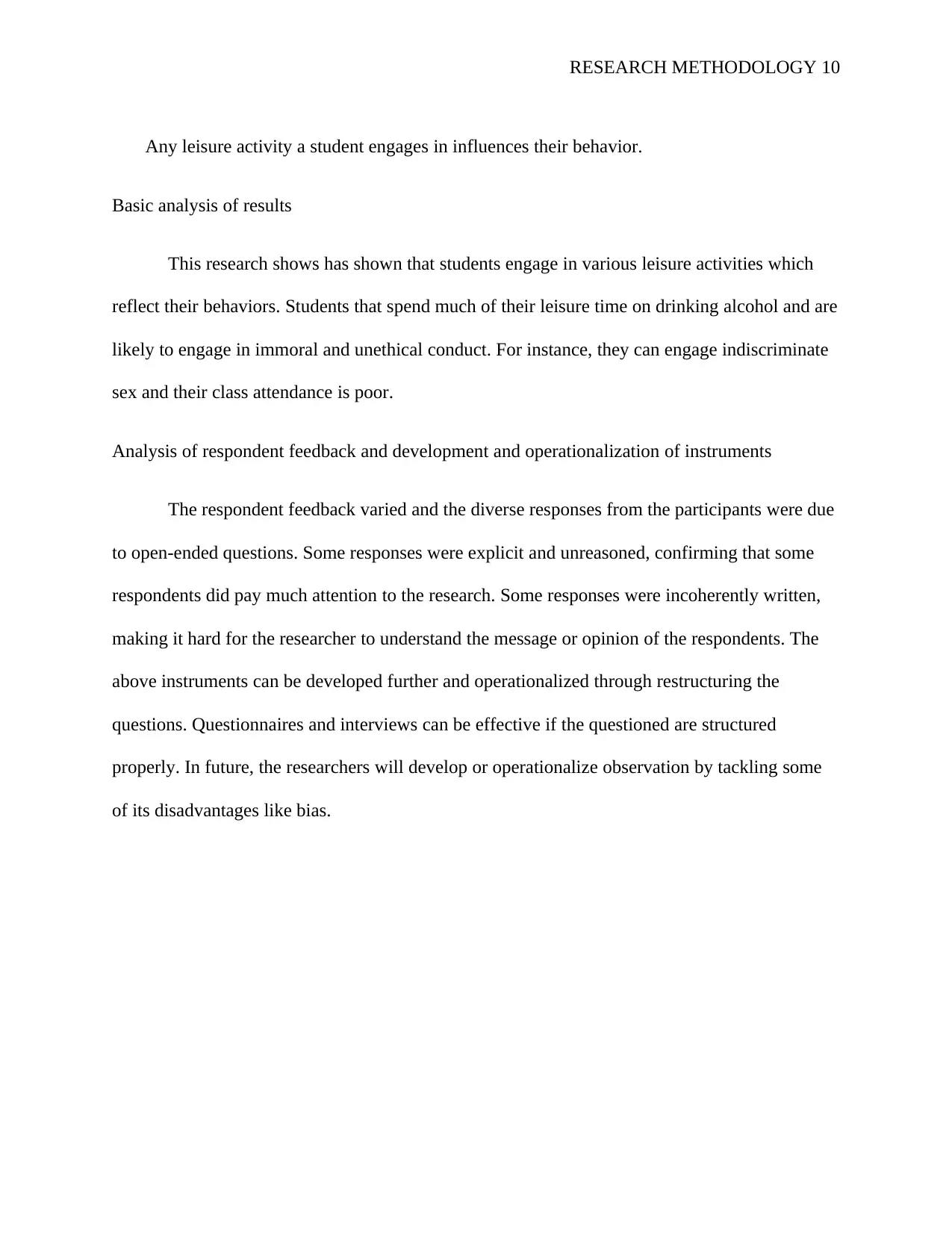
RESEARCH METHODOLOGY 10
Any leisure activity a student engages in influences their behavior.
Basic analysis of results
This research shows has shown that students engage in various leisure activities which
reflect their behaviors. Students that spend much of their leisure time on drinking alcohol and are
likely to engage in immoral and unethical conduct. For instance, they can engage indiscriminate
sex and their class attendance is poor.
Analysis of respondent feedback and development and operationalization of instruments
The respondent feedback varied and the diverse responses from the participants were due
to open-ended questions. Some responses were explicit and unreasoned, confirming that some
respondents did pay much attention to the research. Some responses were incoherently written,
making it hard for the researcher to understand the message or opinion of the respondents. The
above instruments can be developed further and operationalized through restructuring the
questions. Questionnaires and interviews can be effective if the questioned are structured
properly. In future, the researchers will develop or operationalize observation by tackling some
of its disadvantages like bias.
Any leisure activity a student engages in influences their behavior.
Basic analysis of results
This research shows has shown that students engage in various leisure activities which
reflect their behaviors. Students that spend much of their leisure time on drinking alcohol and are
likely to engage in immoral and unethical conduct. For instance, they can engage indiscriminate
sex and their class attendance is poor.
Analysis of respondent feedback and development and operationalization of instruments
The respondent feedback varied and the diverse responses from the participants were due
to open-ended questions. Some responses were explicit and unreasoned, confirming that some
respondents did pay much attention to the research. Some responses were incoherently written,
making it hard for the researcher to understand the message or opinion of the respondents. The
above instruments can be developed further and operationalized through restructuring the
questions. Questionnaires and interviews can be effective if the questioned are structured
properly. In future, the researchers will develop or operationalize observation by tackling some
of its disadvantages like bias.
Secure Best Marks with AI Grader
Need help grading? Try our AI Grader for instant feedback on your assignments.
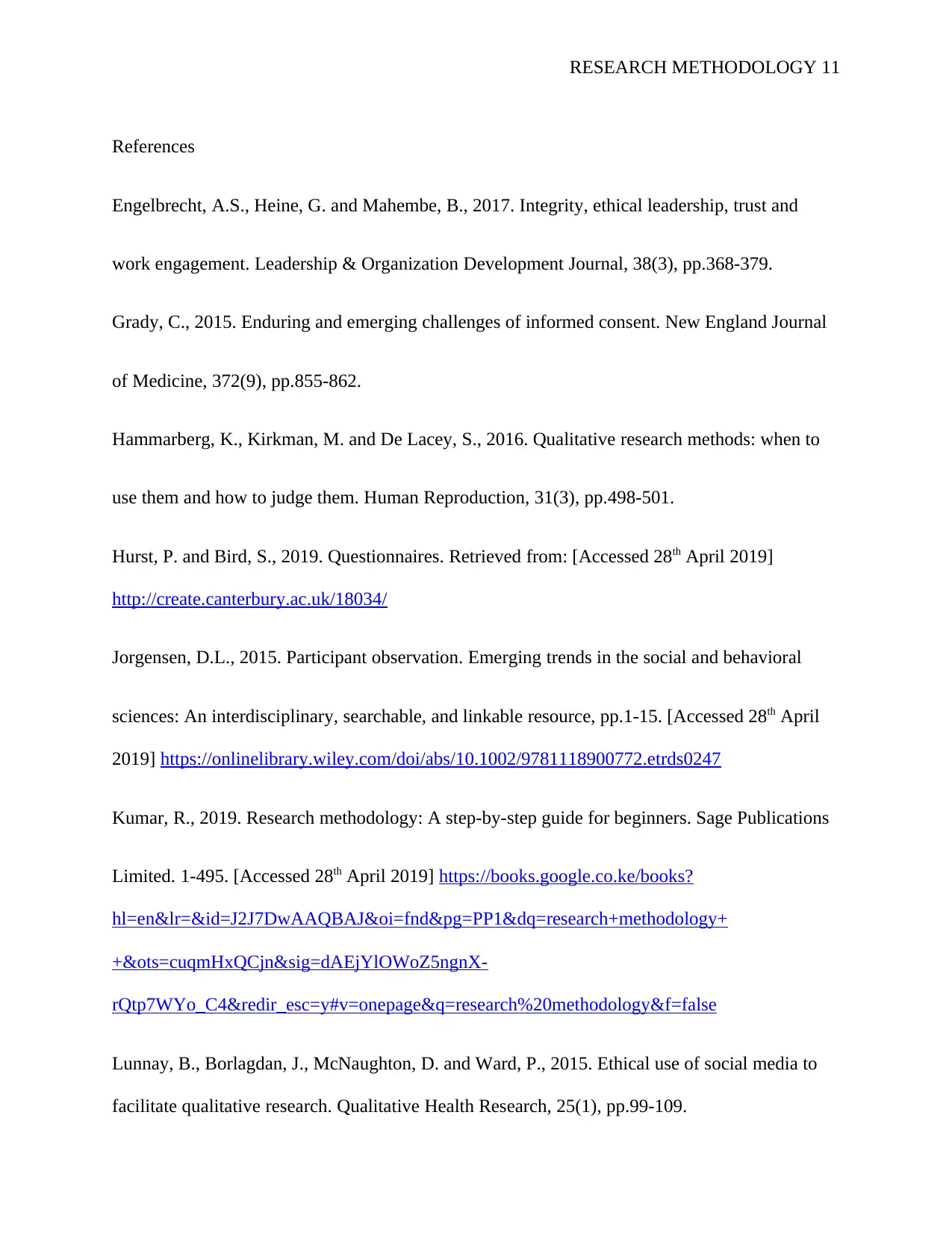
RESEARCH METHODOLOGY 11
References
Engelbrecht, A.S., Heine, G. and Mahembe, B., 2017. Integrity, ethical leadership, trust and
work engagement. Leadership & Organization Development Journal, 38(3), pp.368-379.
Grady, C., 2015. Enduring and emerging challenges of informed consent. New England Journal
of Medicine, 372(9), pp.855-862.
Hammarberg, K., Kirkman, M. and De Lacey, S., 2016. Qualitative research methods: when to
use them and how to judge them. Human Reproduction, 31(3), pp.498-501.
Hurst, P. and Bird, S., 2019. Questionnaires. Retrieved from: [Accessed 28th April 2019]
http://create.canterbury.ac.uk/18034/
Jorgensen, D.L., 2015. Participant observation. Emerging trends in the social and behavioral
sciences: An interdisciplinary, searchable, and linkable resource, pp.1-15. [Accessed 28th April
2019] https://onlinelibrary.wiley.com/doi/abs/10.1002/9781118900772.etrds0247
Kumar, R., 2019. Research methodology: A step-by-step guide for beginners. Sage Publications
Limited. 1-495. [Accessed 28th April 2019] https://books.google.co.ke/books?
hl=en&lr=&id=J2J7DwAAQBAJ&oi=fnd&pg=PP1&dq=research+methodology+
+&ots=cuqmHxQCjn&sig=dAEjYlOWoZ5ngnX-
rQtp7WYo_C4&redir_esc=y#v=onepage&q=research%20methodology&f=false
Lunnay, B., Borlagdan, J., McNaughton, D. and Ward, P., 2015. Ethical use of social media to
facilitate qualitative research. Qualitative Health Research, 25(1), pp.99-109.
References
Engelbrecht, A.S., Heine, G. and Mahembe, B., 2017. Integrity, ethical leadership, trust and
work engagement. Leadership & Organization Development Journal, 38(3), pp.368-379.
Grady, C., 2015. Enduring and emerging challenges of informed consent. New England Journal
of Medicine, 372(9), pp.855-862.
Hammarberg, K., Kirkman, M. and De Lacey, S., 2016. Qualitative research methods: when to
use them and how to judge them. Human Reproduction, 31(3), pp.498-501.
Hurst, P. and Bird, S., 2019. Questionnaires. Retrieved from: [Accessed 28th April 2019]
http://create.canterbury.ac.uk/18034/
Jorgensen, D.L., 2015. Participant observation. Emerging trends in the social and behavioral
sciences: An interdisciplinary, searchable, and linkable resource, pp.1-15. [Accessed 28th April
2019] https://onlinelibrary.wiley.com/doi/abs/10.1002/9781118900772.etrds0247
Kumar, R., 2019. Research methodology: A step-by-step guide for beginners. Sage Publications
Limited. 1-495. [Accessed 28th April 2019] https://books.google.co.ke/books?
hl=en&lr=&id=J2J7DwAAQBAJ&oi=fnd&pg=PP1&dq=research+methodology+
+&ots=cuqmHxQCjn&sig=dAEjYlOWoZ5ngnX-
rQtp7WYo_C4&redir_esc=y#v=onepage&q=research%20methodology&f=false
Lunnay, B., Borlagdan, J., McNaughton, D. and Ward, P., 2015. Ethical use of social media to
facilitate qualitative research. Qualitative Health Research, 25(1), pp.99-109.
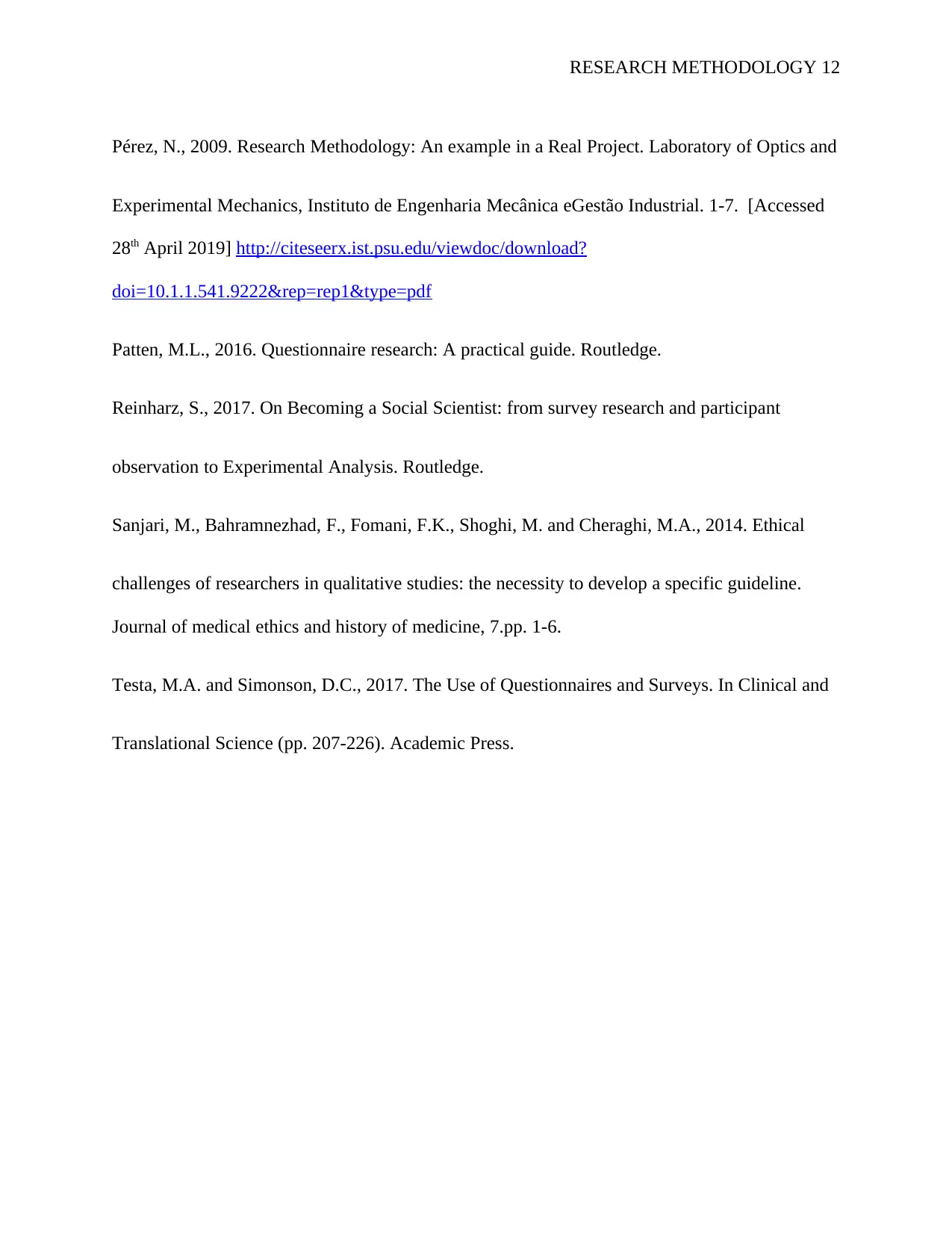
RESEARCH METHODOLOGY 12
Pérez, N., 2009. Research Methodology: An example in a Real Project. Laboratory of Optics and
Experimental Mechanics, Instituto de Engenharia Mecânica eGestão Industrial. 1-7. [Accessed
28th April 2019] http://citeseerx.ist.psu.edu/viewdoc/download?
doi=10.1.1.541.9222&rep=rep1&type=pdf
Patten, M.L., 2016. Questionnaire research: A practical guide. Routledge.
Reinharz, S., 2017. On Becoming a Social Scientist: from survey research and participant
observation to Experimental Analysis. Routledge.
Sanjari, M., Bahramnezhad, F., Fomani, F.K., Shoghi, M. and Cheraghi, M.A., 2014. Ethical
challenges of researchers in qualitative studies: the necessity to develop a specific guideline.
Journal of medical ethics and history of medicine, 7.pp. 1-6.
Testa, M.A. and Simonson, D.C., 2017. The Use of Questionnaires and Surveys. In Clinical and
Translational Science (pp. 207-226). Academic Press.
Pérez, N., 2009. Research Methodology: An example in a Real Project. Laboratory of Optics and
Experimental Mechanics, Instituto de Engenharia Mecânica eGestão Industrial. 1-7. [Accessed
28th April 2019] http://citeseerx.ist.psu.edu/viewdoc/download?
doi=10.1.1.541.9222&rep=rep1&type=pdf
Patten, M.L., 2016. Questionnaire research: A practical guide. Routledge.
Reinharz, S., 2017. On Becoming a Social Scientist: from survey research and participant
observation to Experimental Analysis. Routledge.
Sanjari, M., Bahramnezhad, F., Fomani, F.K., Shoghi, M. and Cheraghi, M.A., 2014. Ethical
challenges of researchers in qualitative studies: the necessity to develop a specific guideline.
Journal of medical ethics and history of medicine, 7.pp. 1-6.
Testa, M.A. and Simonson, D.C., 2017. The Use of Questionnaires and Surveys. In Clinical and
Translational Science (pp. 207-226). Academic Press.

RESEARCH METHODOLOGY 13
1 out of 13
Related Documents
Your All-in-One AI-Powered Toolkit for Academic Success.
+13062052269
info@desklib.com
Available 24*7 on WhatsApp / Email
![[object Object]](/_next/static/media/star-bottom.7253800d.svg)
Unlock your academic potential
© 2024 | Zucol Services PVT LTD | All rights reserved.



